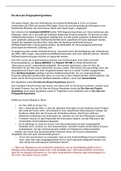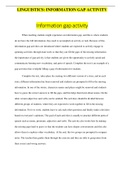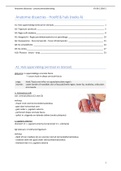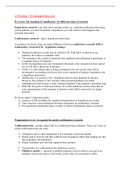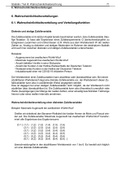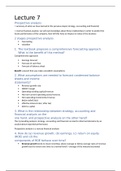Introduction
1
,Lecture 1 Life cycle assessment
Suppose you are running a coffee bar
Different options to consider:
Which is a more environmental friendly option?
• a disposable cup (paper/plastic, sent to landfill)
• a ceramic mug (reusable, washed in dishwasher)
• a travel mug (reusable, hand-washed)
Intuitive answers
1. Disposable = waste = bad
2. Bring your own thing is always better
3. Dish washers are a shame
4. Paper is better than plastic
5. Etcetera
So there are lots of prejudices and gut feelings. Is intuition a good guide?
Science-based answers
We need science-based, rational, prejudice-free, answers. That means:
• evidence-based
• quantitative
• covering all aspects
is about trading of the good and bad things. It is about having the quantitative data (numbers) to
compare and make valid conclusions. Furthermore, we need to take all aspects into account. We
need to take the production, resources, waste etc. into account when companies are trying to reduce
CO2 for example. We need to find a balance between improving and making it only worse.
2
,The idea of a life cycle
It is about the life cycle. If you have a
product, you use it. Before it is used, it
needs to be produced and even before
that the resources need to be acquired.
Then there is distribution, use and then
end of life. There is a tension, that is in
the supply chain. The life cycle is more
than a supply chain, because there is
also end of life disposal and hopefully
recycling.
Putting the function central
The life cycle perspective necessitates a quantitative approach But it is not fair to compare 1 reusable
mug with 1 disposable cup. You must account for the trip rate (number of uses) and other sources of
variation. So you need to take into account how often it can be used.
Functional unit: one “medium”( i.e. 16 oz. or 475 ml) cup of coffee per day served for consumption
on site at a Quebec restaurant for one year. It is not about the cup, but about having a coffee.
Data intensive
Lots of data required, especially when we want to be quantitative.
• emissions • energy use • water use
• transport • waste • packaging
• etc
The following parameters influence the results:
* Mass of disposable cups;
* Quantities of hot water and soap used to wash travel mugs;
* Energy context (results apply to Quebec only)
Multi-criteria problem
3
, We get an overall result on different aspects, for example on human health, climate change, resource
depletion, water consumption and quality of the ecosystem.
But the reward is good. But far more interesting in-depth results. Not only the comparison, but also
the in-depth results are interesting to look at.
Sustainability > environment
Sustainability is more than just the environment, it is also about the profit of the company. And what
about the costs? There are different costs for the restaurant with respect to the different cup/ mug
options. A sort of life cycle is also popping up here. We need to consider more than the environment,
it is also economic and social aspects. Furthermore, there are often multiple scenarios, with
assumptions on trips, demand, supply etc. there are uncertainties in scenarios that come up.
Wanted: a systematic approach
Quantitative environmental Life Cycle Assessment (LCA) of products
• Quantitative (as much as possible)
• Environmental (thus not costs, safety, user friendliness, ...)
• Life Cycle (from the cradle to the grave)
• Products (with a central role for the function of the product)
It is not about the company or the consumer or material ,the LCA is about the life cycle of a product.
So also the production, use and environment of the product.
4

